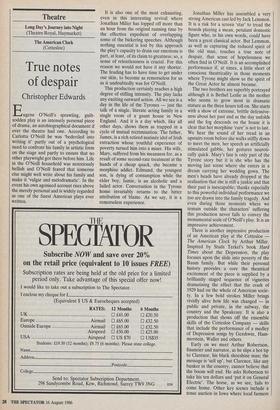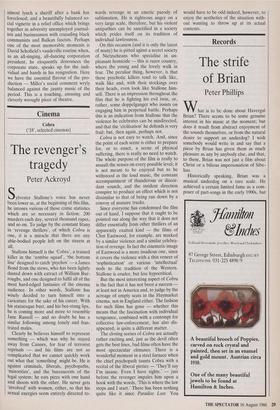Theatre
Long Day's Journey into Night (Theatre Royal, Haymarket) The American Clock (Cottesloe)
True notes of despair
Christopher Edwards
Eugene O'Neill's sprawling, guilt- sodden play is an intensely personal piece of drama, an autobiographical document if ever the theatre had one. According to Carlotta O'Neill he was 'bedeviled into writing it' partly out of a psychological need to confront his family in artistic form on the stage and partly to ensure that no other playwright got there before him. Life in the O'Neill household was notoriously hellish and O'Neill feared that someone else might well write about his family and make it 'vulgar and melodramatic'. In the event his own agonised account rises above the merely personal and is widely regarded as one of the finest American plays ever written. It is also one of the most exhausting, even in this interesting revival where Jonathan Miller has lopped off more than an hour from the original running time by the effective expedient of overlapping some of the bickering speeches. Although nothing essential is lost by this approach the play's capacity to drain our emotions is part, at least, of its claim to greatness; so, a sense of relentlessness is crucial. For this reason we would not have it any shorter. The feuding has to have time to get under our skin, to become as remorseless for us as it undoubtedly was for O'Neill.
This production certainly reaches a high degree of stifling intensity. The play lacks any exciting outward action. All we see is a day in the life of the Tyrones — just the talk of a single, literate acting family in a single room of a gaunt house in New England. And it is a day which, like all other days, shows them as trapped in a cycle of mutual recrimination. The father, James, is a rich retired matinee idol of Irish extraction whose youthful experience of poverty turned him into a miser. His wife, Mary, suffered from his meanness for, as a result of some second-rate treatment at the hands of a cheap quack, she became a morphine addict. Edmund, the youngest son, is dying of consumption while the elder boy, Jamie, is an alcoholic and a failed actor. Conversation in the Tyrone home invariably returns to the bitter attribution of blame. As we say, it is a remorseless experience. Jonathan Miller has assembled a very strong American cast led by Jack Lemmon. It is a risk for a screen 'star' to tread the boards playing a mean, petulant domestic figure who, in his own words, could have been a great classical actor. But Lemmon, as well as capturing the reduced spirit of the old man, touches a true note of despair, that sense of hopelessness we often find in O'Neill. It is an accomplished performance if, at times, a little short of conscious theatricality in those moments where Tyrone might show us the spirit of the Great Actor he almost became.
The two brothers are superbly portrayed although it is Bethel Leslie as the mother who seems to grow most in dramatic stature as the three hours toll on. She starts with a show of extreme, brittle defensive- ness about her past and as the day unfolds and the fog descends on the house it is clear that her morphine 'cure' is not to last. We hear the sound of her tread in an upstairs room before she walks stiffly down to meet the men, her speech an artificially stimulated gabble, her gestures neuroti- cally quick. Mary's fate is only part of the Tyrone story but it is she who has the moving last scene where she enters in a dream carrying her wedding gown. The men's heads have already dropped at the realisation that she is still a junkie and that their past is inescapable; thanks especially to this powerful individual performance we too are drawn into the family tragedy. And even during those moments where we remain outside the characters' suffering this production never fails to convey the monumental scale of O'Neill's play. It is an impressive achievement.
There is another impressive production of an American play at the Cottesloe — The American Clock by Arthur Miller. Inspired by Studs Terkel's book Hard Times about the Depression, the play focuses upon the slide into poverty of the Baum family. But while their personal history provides a core the theatrical excitement of the piece is supplied by a brilliantly staged sequence of vignettes dramatising the effect that the crash of 1929 had on the whole of American socie- ty. In a few bold strokes Miller brings vividly alive how life was changed — in public and private, in the subway, the country and the Speakeasy. It is also a production that shows off the ensemble skills of the Cottesloe Company — skills that include the performance of a medley of Depression songs by Gershwin, Ham- merstein, Waller and others.
Early on we meet Arthur Robertson, financier and narrator, as he slips a hot tip to Clarence, his black shoeshine man; the message is 'sell up', but Clarence, like any banker in the country, cannot believe that the boom will end. He asks Robertson to take his ten dollars and 'put it on General Electric'. The horse, as we see, fails to come home. Other key scenes include a tense auction in Iowa where local farmers almost lynch a sheriff after a bank has foreclosed; and a beautifully balanced so- cial vignette in a relief office which brings together in adversity unemployed journal- ists and businessmen with crusading black communists and Balkan fascists. Perhaps one of the most memorable moments is David Schofield's vaudeville routine when, as an all-singing, all-dancing corporation president, he eloquently denounces the corporate state, speaks up for the indi- vidual and hands in his resignation. Here we have the essential flavour of the pro- duction — Miller's social comment wryly balanced against the jaunty music of the period. This is a touching, amusing and cleverly wrought piece of theatre.











































 Previous page
Previous page